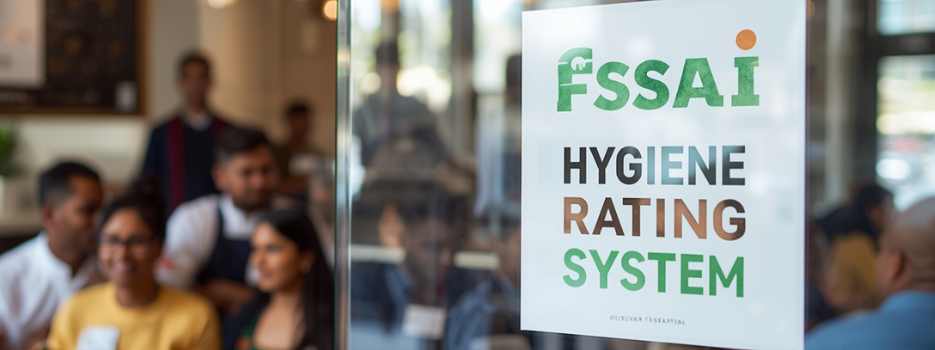Before eating at any restaurant or ordering food, users first check the food’s ratings. These ratings help consumers make an informed choice. The Food Safety and Standards Authority of India implemented a voluntary program named ‘FSSAI Hygiene Rating System.’ These ratings help the food businesses to improve their food quality and standard requirements. The main purpose of this system’s establishment is to help consumers make wise choices while eating out. Let’s break down the page to know how this voluntary system is helpful for customers and businesses, including the role of the FSSAI license and its key parameters.
1. What is the FSSAI Hygiene Rating System?
The ‘FSSAI Hygiene Rating System‘ acts as a voluntary online program. Food operators, including restaurants and cafes, receive ratings on a 1-to-5 scale for their food safety and hygiene compliance. Rating 1 is poor food quality, while rating 5 is excellent. The system is basically designed for consumers as well as food businesses to make an informed decision.
2. How Does the FSSAI Hygiene Rating System Work?
The third-party agency of food safety officers conducts the self-assessment through an audit to ensure the food safety and quality standards. This is how it works:
- Self-Analysis: Before the inspection by the food and safety officers, the FSSAI license holders need to first conduct the self-assessment based on an informed checklist. This checklist consists of the food hygiene and safety requirements.
- Audit by Third Party: The officers from the FSSAI department will visit the food operator’s location to ensure the validity. A physical inspection will be conducted to verify the self-assessment accuracy.
- Food Ratings: From 1 to 5 represent the standard of food quality and hygiene compliance. The food business will be awarded with a 1 rating, which is poor, or a five rating if food quality is good. In general, most of the food restaurants get the 3-star or above ratings, which are depicted as good.
- Display Ratings: The food businesses can use the rating certificate to display it at their premises. It allows consumers to make an informed decision before purchasing the food. Furthermore, the businesses can use the rating standard on their online platform to boost their reach.
User Query: How to Register a Home-Based Food Business in India?
3. The Benefits of the Food Hygiene Rating System
The benefits of this system are not limited to consumers but are also advantageous for food businesses. This can be understood as
For Consumers: The FSSAI hygiene rating system acts as a tool for customers. It helps businesses to make an informed choice before eating in any food place. Through the ratings, businesses get the information based on a transparent and verified hygiene rating.
- Consumers can choose a good food destination based on its hygiene ratings.
- The system encourages awareness of consumers related to food safety and hygiene compliance.
- A good food rating is crucial to protect the consumer from unsafe food and reduce illness chances.
For Businesses: FSSAI registration with food ratings helps the food businesses to enhance their food hygiene and safety standards. In the markets, the ratings offer a competitive edge to businesses and boost consumer trust.
- The rating system is a plus point for FBOs to meet and sustain hygiene standards.
- Positive ratings boost consumers’ confidence, which enhances brand recognition.
- With good food quality ratings, it attracts the consumer base that directly boosts the business’s sales.
4. Types of Food Businesses Are Included in the Hygiene Scheme
The food hygiene scheme, which includes the potential food operators, is
- Those that provide the food services, such as hotels, restaurants, cafes, dhabas, etc.
- Meats shops
- Bakeries
- Sweet Shops
- Roadside vendors
5. The Key Eligibility to Get Food Hygiene Ratings
Before enrolling in the FSSAI Hygiene Rating System Scheme, the food businesses are required to fulfill the specific requirements. The requirements include:
A. Get the FSSAI License/Registration
FoSCoS FSSAI registration is mandatory for all food businesses in India. It demonstrates that the FBO has met all safety and quality standards before serving food to consumers.
B. Hire a Food Safety Supervisor & Train All Workers
The FBOs must appoint a food safety supervisor who should be trained in maintaining the food quality and other safety practices. Furthermore, train all workers who are in your food business.
C. Must Display Food Safety Display Boards (FSDBs)
As per the FSSAI guidelines, a proper display of the Food Safety Display Board (FSDB) is essential. Add multiple options for feedback, such as SMS, website, or WhatsApp. FBOs also need to display their FSSAI registration/license on their premises for consumers.
D. Periodic Testing of Food Samples
The FSSAI-licensed food businesses must send their food samples to an FSSAI-recognized lab for food testing. All food and water safety & quality parameters should be tested.
6. The Total Score Checklist Rating Table
| Hygiene Number | Hygiene Rating | Category | Score (%) |
| 5 | 😃😃😃😃😃 | Excellent | 81 to 100 |
| 4 | 😃😃😃😃 | Very Good | 61 to 80 |
| 3 | 😃😃😃 | Good | 41 to 60 |
| 2 | 😃😃 | Needs Improvement | 21 to 40 |
| 1 | 😃 | Urgent Improvement | 21 or below |
10. Final Thoughts | FSSAI Registration to be Eligible for FSSAI Hygiene Rating System
The Department of Food Safety and Standards Authority of India (FSSAI) established the FSSAI Hygiene Rating System for consumers. Through the rating system, the customers get the legal validity to rate any cafe or restaurant’s food on its food quality and hygiene compliance. If food businesses fail to meet specific requirements, they need to improve their food practices for better management. Only FSSAI-registered/licensed FBOs are eligible for the hygiene rating scheme.

